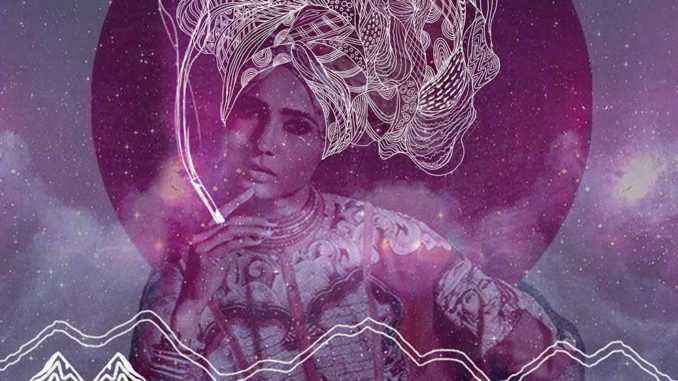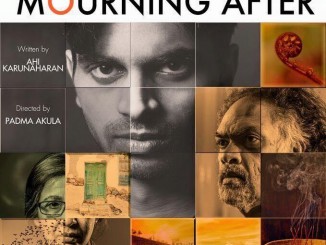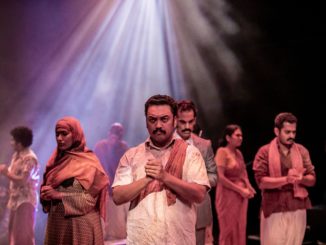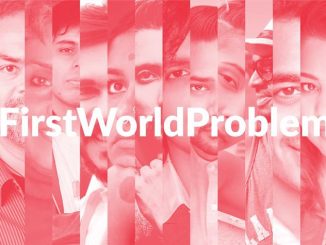
[16 Narratives]
There was a palpable feeling of community spirit at the Basement Theatre on Tuesday night with the opening of First World Problems 2.0 – an anthology of sixteen short plays staged by members of the South Asian community. When the doors opened, the cast of around twenty-five actors were assembled in the playing area, energetically chatting, loudly welcoming friends or relatives in the capacity crowd, or dancing, singing and stretching. Celebrating new South Asian stories, the production began with the cacophony of noise and colour that we have come to associate with the sub-continent. But this wasn’t a production that was about reinforcing stereotypes – rather it was a platform to encourage the development of innovative storytelling from the diverse South Asian creatives who call Auckland home.
The idea for this anthology of new works was developed by Agaram Productions and first presented last year as a platform to develop new work and as a space for members of the South Asian community to experiment and express themselves. First World Problems 2.0 consists of sixteen short works, ranging from spoken word and rap, to monologues and small plays, all of which have been curated by Sananda Chatterjee, a member of Prayas Theatre which is known as New Zealand’s largest South Asian theatre company. Chatterjee, who recently assisted in the direction of A Fine Balance (2019) and co-directed Prayas’ Dara (2018), brings attention to physicality and ensemble work, helping to weave together the sixteen separate contributions to create a seamless production that feels very whole and is more than the sum of its individual parts.
The performance opens with the piece In The Margins (written and directed by Sananda Chatterjee) that sees the entire cast adopt prayer positions to chant ‘Om exotic’ repeatedly. Functioning as a spoken word prologue for the production, the actor Gemishka Chetty addresses the audience in lyrical language to introduce the stories that will follow: ‘welcome to the margins of the pages we have always called home’. While there are familiar themes of identity politics and dislocation common to the migrant and diasporic experience that run through the plays, also evident are topics of gender, sexuality, maintaining cultural authenticity and intergenerational friction. There is a sense that the works are attempting to move beyond traditional stereotypes of the migrant experience. Innovative standouts were the comic works including Boom Shankar, written by Bala Shingade and Aman Bajaj which explores a day in the life of the bomb detonator Shankar (played by Bala Shingade) who is a graduate of BDSM (the Bomb Diffusing School of Manukau). The play which could easily be developed further explores the funny antics of the main character who is attempting to diffuse a bomb while getting easily distracted by a phone call by his Mother and his desire to date his Kiwi colleague. Another comic standout was MM ki Mummy written and directed by Chatterjee which explores the trials and tribulations of being a Desi superhero (Porvi Fomra) contending with an overbearing Indian mother (Sneha Shetty). The other comic work that seems to push innovative boundaries is Aye Chutiya Hai Kya written by Mana Kharbanda and directed by Mustaq Missouri. The play sees a depressed man (Aman Kharbanda) in a counselling session with a therapist (Maulik Thakkar) complaining about the meaninglessness of English swear-words and his inability to express his emotions. When prompted further the depressed man extols the virtues of the Hindi swearword ‘Chutiya’ that can be deployed in numerous ways to suit every conceivable slight or circumstance.
Three or four differently sized boxes are the only set pieces that double as coaches, doors, or DJ decks, in a striped back set design by Natasha Iyer. The backwall of the performance space features posters heralding the titles of the mini-plays and performances the audiences will encounter. These include provocative titles such as You Don’t Have To Die Alone (written and performed by Sneha Shetty), Mother Freaking Hood (written by Sonal Joshi), and My Vagina Bleeds (written and performed by Gemishka Chetty).
As these poster titles allude to, one of the major themes emerging in these works was a feminist politics that challenges not only Western orientalism and the exotification of Indian women, but also Indian conservative patriarchal attitudes that are prevalent within the South Asian community. In Mother Freaking Hood, for instance, a new mum contends with the social stigma of bottle-feeding while another is chastised by an older Indian woman for breastfeeding in public. In the spoken-word performance My Vagina Bleeds, the lead performer Geminshka Chetty smudges red lipstick off her face to challenge social expectations of womanhood while warning that ‘for every vagina there is a dick, and all those dicks better keep in check’. The concern with women’s stories and experiences is also explored in Nothing to Hide, written by Shreya Gejji and Natasha Trilokekar, and performed compellingly by Leela Patel who brings a believable exhaustion to the role. The short and punchy drama is told from the point of view of a mother who is struggling with work and family pressures while contending with menstrual flows and medical complications that she has to deal with in private. The piece is wonderfully written with some poetic moments that explore how ‘a women’s body seems to belong to everyone but her’.
Some of the performances work better than others. While the rap piece 99 Problems carried the important reminder that for the cast and community being Desi was only one problem they contend with among many, the faltered delivery and forgotten lines made for several awkward moments. A few of the works didn’t seem to go anywhere and could have used a bit more directing and development. Burn Out written by Roxane Sarkari is one example, portraying a son returning home to a disappointed family which made little sense given the lack of dialogue or exposition.
The title of the production seems to suggest an effort to move beyond the dislocation of the diasporic experience that is common to migrant theatre, and to focus instead on ‘common’ and universal issues that impact on everyday modern existence. Even as I support the desire of culturally diverse artists not be pigeonholed into creative boxes – condemned to constantly explore issues of cultural identity and cultural slippage – there was nevertheless something troubling about this focus for me. There seemed to be an ambiguity in the politics of these works about their location and connection to Aotearoa New Zealand. I felt that these stories could have been situated anywhere. Apart from the occasional referencing of Munukau, these plays could have been set anywhere in the ‘West’ and I didn’t get a sense that these works were contending in any meaningful way with the specificity of life in Aotearoa New Zealand. There seemed to be no acknowledgement of the Desi community as tauiwi or any commentary on indigenous politics. Ultimately in celebrating ‘First World Problems’ this production seemed to aspire to a universality that appeared to be blind to white settler colonialism and the ambiguous position that migrant communities often find themselves occupying as beneficiaries of colonial legacies that underpin ‘First World’ experiences.
First World Problems 2.0 plays Basement Theatre until 19 Oct. Curated and Directed by Sananda Chatterjee. A Co-production by Prayas Theatre, Agaram Productions and Oriental Maidens.




Leave a Reply